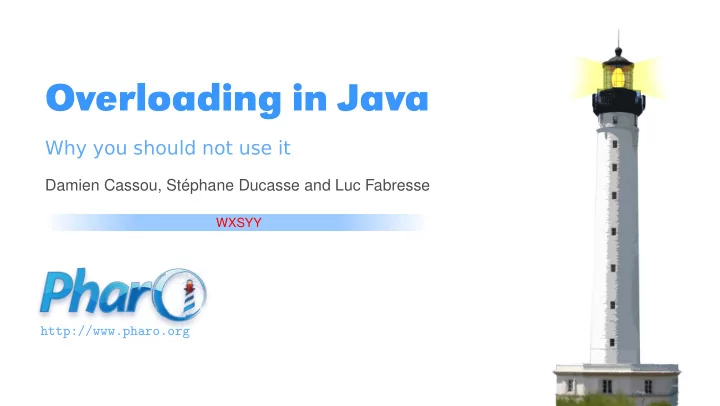

Overloading in Java Why you should not use it Damien Cassou, Stéphane Ducasse and Luc Fabresse WXSYY http://www.pharo.org
Goal � What is overloading? � Why is it a problem? � What can you do? This lecture is in the context of the Java programming language. � It is an incentive to understand for real double dispatch (without overloading) WXSYY 2 / 14
Overloading Overloading: methods sharing a name. public class OverloadingSimple { public String m(int a) { return "my parameter is an int"; } public String m(String b) { return "my parameter is a string"; } public static void main(String[] args) { System.out.println(new OverloadingSimple().m(123)); System.out.println(new OverloadingSimple().m("a")); } } Seems nice at first to avoid thinking about names. WXSYY 3 / 14
Exercise class A { public void f(A a) { print("A.f(A)"); } } class B extends A { public void f(A a) { print("B.f(A)"); } public void f(B b) { print("B.f(B)"); } } A a = new B(); // take care, this is a B! B b = new B(); a.f(a); a.f(b); b.f(a); b.f(b); What are the results of these 4 expressions? WXSYY 4 / 14
Solution class A { public void f(A a) { print("A.f(A)"); } } class B extends A { public void f(A a) { print("B.f(A)"); } public void f(B b) { print("B.f(B)"); } } A a = new B(); // take care, this is a B! B b = new B(); a.f(a); a.f(b); b.f(a); b.f(b); B.f(A) B.f(A) B.f(A) B.f(B) WXSYY 5 / 14
Explanation Overloading + sub-typing is confusing in Java. In the presence of a message send, the compiler searches a compatible signature and stores it. During execution, the lookup algorithm searches for a method with this exact signature, regardless of the dynamic types of arguments. WXSYY 6 / 14
Looking at a Real Case: a Visitor public class A { public void accept(Visitor visitor) { visitor.visit(this); } } public class Visitor { public void visit(A a) { System.out.println("Visitor.visit(A)"); } } Visitor visitor = new Visitor(); new A().accept(visitor); // "Visitor.visit(A)" All is well in this perfect world... WXSYY 7 / 14
Uh! My Visitor is not Executed! public class SubA extends A { public void accept(Visitor visitor) { visitor.visit(this); } } public class SubVisitor extends Visitor { public void visit(SubA subA) { System.out.println("SubVisitor.visit(SubA)"); } } Visitor visitor = new SubVisitor(); new SubA().accept(visitor); // "Visitor.visit(A)" When method SubA.accept() is compiled, the message visitor.visit(this) is bound to visit(A) , the only compatible signature in Visitor . During execution, visit(SubA) is ignored. WXSYY 8 / 14
Possible Ugly ’Solutions’ One way to fix that could be to add a visit(SubA) method in Visitor (if you can change it): public class Visitor { public void visit(A a) { System.out.println("Visitor.visit(A)"); } public void visit(SubA a) { System.out.println("Visitor.visit(SubA)"); } } This works but has 2 problems (see next slides): � the methods accept() in A and SubA are identical � you can’t use the visit() methods directly WXSYY 9 / 14
In Particular The methods accept() in A and SubA are identical: public class A { public void accept(Visitor visitor) { visitor.visit(this); } } public class SubA extends A { public void accept(Visitor visitor) { visitor.visit(this); } } You could think that SubA.accept() is useless because its content is the same as A.accept() . But it’s not useless as, inside it, the message visitor.visit(this) binds to the signature visit(SubA) which is what we want. WXSYY 10 / 14
In Particular You can’t use the visit() methods directly: public class Visitor { public void visit(A a) { System.out.println("Visitor.visit(A)"); } public void visit(SubA a) { System.out.println("Visitor.visit(SubA)"); } } Visitor visitor = new Visitor(); A subA = new SubA(); visitor.visit(subA); // "Visitor.visit(A)" If you use the visitor directly (i.e., without going through accept() methods), the static types become important to decide which visit() method to execute. WXSYY 11 / 14
The Real Solution Don’t use overloading and prefer dedicated method names: public class A { public void accept(Visitor visitor) { visitor.visitA(this); } } public class Visitor { public void visitA(A a) { System.out.println("Visitor.visitA(A)"); } } WXSYY 12 / 14
Summary 1. overloading is nice 2. just pay attention you don’t mix it with sub-typing... 3. but OO programming is all about sub-typing... 4. don’t use overloading WXSYY 13 / 14
A course by and in collaboration with Inria 2016 Except where otherwise noted, this work is licensed under CC BY-NC-ND 3.0 France https://creativecommons.org/licenses/by-nc-nd/3.0/fr/
Recommend
More recommend